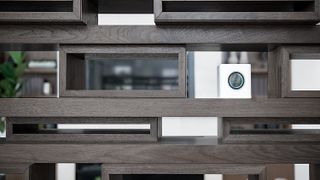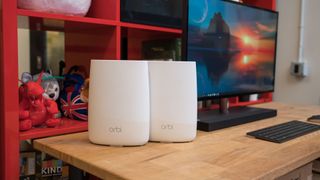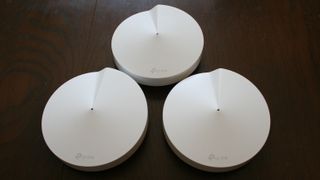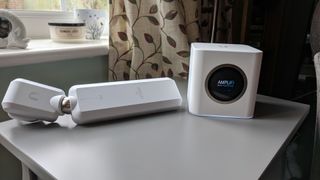Best mesh Wi-Fi routers

If you haven’t considered getting one of the best mesh Wi-Fi routers for your home or office, this list will certainly change your mind. Unlike traditional wireless routers, which are typically single receivers situated only in one room while broadcasting Wi-Fi throughout the rest of your house or apartment, the best mesh Wi-Fi routers are made up of several units.
These units can be strategically placed around your home or office to guarantee a strong and consistent Wi-Fi signal throughout your whole space. Simply by placing several nodes in key areas of your home, you will get a solid, unified Wi-Fi network with the best mesh Wi-Fi routers, no matter where you are in that whole space.
That’s unlike how Wi-Fi extenders work, which only take the original Wi-Fi signal from the best wireless routers and repeat it to extend the original router’s range. This approach requires a separate SSID for the extender, as you’re essentially just creating a second network, and can be a pain since your device won't automatically switch to a different network. In addition, filling your home with several Wi-Fi networks can negatively impact the network’s performance.

Google Wifi
Specifications
Reasons to buy
The Google Wifi tops, possibly, the best wireless mesh routers we’ve ever used, and we’re not saying that casually. In fact, we’d even go so far as to say that it may be the best wireless mesh router, at least to date. Not only does it have the power to push fast Wi-Fi throughout your house – an even more impressive feat considering its diminutive size, but it’s also fairly cheap and not that hard to set up. Setting up is so simple that all you have to do to configure Google Wifi is to download an app to your smartphone, scan some QR codes and just place the nodes where you want around your house. With Google WiFi, the company has taken dominion over the mesh WiFi world.

Netgear Orbi
Specifications
Reasons to buy
If you have deep pockets, then check out the Netgear Orbi, which may be one of the best wireless mesh routers money can buy. Instead of something like Google Wifi, which uses three identical nodes to create the network, you’ll get one main router and several satellite nodes to plug into power outlets around your home. In addition, the Orbi touts more than enough Ethernet ports, making it an exceptional option for anyone with a number of devices that need a hardwired connection. This mesh router is the best choice for consumers who use their network mostly for gaming, particularly across multiple devices.

TP-Link Deco M5
Specifications
Reasons to buy
If you’re looking for a way to spread Wi-Fi throughout your home without having to spend a lot of dough, then look into the TP-Link Deco M5. It’s not as speedy as some of the other best mesh Wi-Fi routers on this list, but if you’re not too concerned about getting the maximum theoretical throughput, which you probably won’t be able to take full advantage of anyway, this shouldn’t be too much of an issue. Setup, similar to the other devices here, is a breeze, even if you’re not tech-savvy. The TP-Link Deco M5 is among the best wireless mesh routers for those who don’t want to get too technical.

Ubiquiti Amplifi HD
Specifications
Reasons to buy
If you love Apple’s design philosophy, enjoy having attractive gadgets set up around your home, and have more than enough extra money sitting around, then the Ubiquiti Amplifi HD is the perfect mesh router for you. You’ll find a lot to love with this device, especially if you live in a large house and can take advantage of the full power that this mesh Wi-Fi setup provides, as it’s capable of a very large amount of throughput. You might find that the value diminishes quite a bit when you live in a smaller space however since there are more affordable alternatives on hand for small to medium homes. The Ubiquiti Amplifi HD may be pricey, but you’re paying for a piece of tech that both exudes style and a ton of substance. That’s more than enough to justify the price tag, making this a great addition to the best wireless mesh routers list.

Linksys Velop
Specifications
Reasons to buy
Reasons to avoid
While it’s expensive and not quite as powerful as the other Wi-Fi mesh routers on this list, there’s something to be said about the simplicity that the Linksys Velop offers. It might come with a heftier price than the competition, but the Velop will appeal to people who need to create a Wi-Fi network and want to avoid setting it up. More tech-savvy users will most likely look elsewhere – why spend money when you can do the work yourself for free? However, for most users, the Linksys Velop is among the best wireless mesh routers because of the convenience it offers from the start. It’s also completely modular, so you only have to pick up as many nodes as you actually need – one node will cover up to 2,000 square feet.
Get daily insight, inspiration and deals in your inbox
Get the hottest deals available in your inbox plus news, reviews, opinion, analysis and more from the TechRadar team.
Bill Thomas (Twitter) is TechRadar's computing editor. They are fat, queer and extremely online. Computers are the devil, but they just happen to be a satanist. If you need to know anything about computing components, PC gaming or the best laptop on the market, don't be afraid to drop them a line on Twitter or through email.

